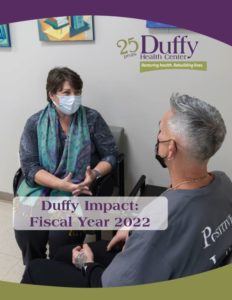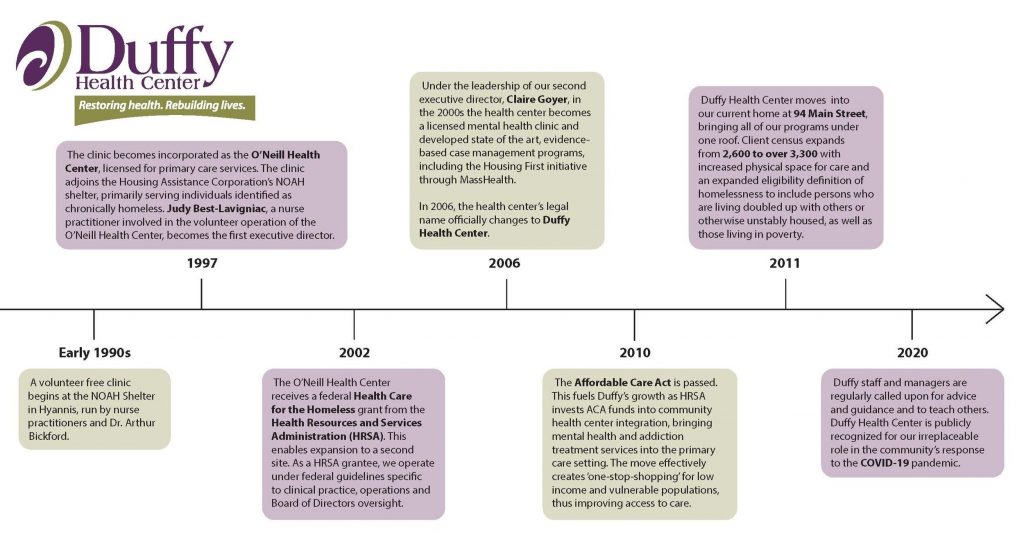Our Mission
The mission of Duffy Health Center is to provide equitable, integrated healthcare for persons with complex health and social needs on Cape Cod.
Our Vision
We envision a Cape Cod where all persons have access to quality healthcare, safe and stable housing, and lives filled with connection and purpose.
Our Values
Duffy values are the THREAD that connects all we do:
- Trust between patients and providers is the cornerstone of our healthcare model.
- Housing is a human right.
- Recovery is possible for all individuals.
- Equity means all patients get the care they need and deserve.
- Advocacy for those in need creates a stronger and healthier community for all.
- Dignity is inherent in every person.
Our History & Accomplishments
For over thirty years, Duffy Health Center has provided health care, outreach and support services to adults who are experiencing or at risk for homelessness in Barnstable County. Throughout its history, Duffy has always evolved and expanded to meet clients’ needs.
Duffy’s origins start in the early 1990s, when a group of nurse practitioners and Dr. Arthur Bickford opened a volunteer free clinic. Toward the end of the decade, in 1997, the clinic incorporated as the O’Neill Health Center and was licensed for primary care services.
At that time, the health center adjoined the Housing Assistance Corporation’s NOAH shelter, now known as St. Joseph House, and predominantly served individuals identified as chronically homeless. Judy Best-Lavigniac, a nurse practitioner involved in the volunteer operation of the O’Neill Health Center, became the agency’s first executive director.
Over time, the growing number of clients led to an expansion of services. In 2002 the O’Neill Health Center received a federal Health Care for the Homeless grant from the Health Resources and Services Administration (HRSA). As a HRSA grantee, O’Neill began to operate under federal guidelines specific to clinical practice, operations, and Board of Directors oversight. The federal funds enabled expansion to a second site.
While the O’Neill Health Center grew, the staff realized the necessity of addressing the underlying causes of homelessness as a part of their client’s care. They began working outside the agency to create community partnership with allied organizations. Those strategic partnerships resulted in ongoing financial support and creation of innovative programs that help clients achieve and maintain both health and housing.
A new century brought further growth and innovation. Under the leadership of its second executive director, Claire Goyer, the health center became a licensed mental health clinic and developed state-of-the-art, evidence-based case management programs, including the Housing First initiative through MassHealth. In 2006, the O’Neill Health Center’s name officially changed to Duffy Health Center.
Since 2010, there has been public outcry and concern about opiate addiction across Cape Cod,
and calls for improved access to treatment and recovery. Duffy has responded to the opiate use disorder epidemic by using federal funds from the Affordable Care Act (ACA) to integrate mental health and addiction treatment into their primary care setting, creating “one-stop” shopping for low income and vulnerable populations when they turn to Duffy for help. The agency is considered a leader in treatment, recovery and mental health services that are supportive and collaborative with community partners.
In 2011, Duffy moved to its current location, 94 Main Street, which finally allowed all its programs to be located under one roof. Duffy’s client population expanded due to the increased physical space for care and due expanded the eligibility definition of homelessness to include persons who are living doubled up with others or otherwise unstably housed, as well as those living in poverty and needing a more integrated model of care.
Over the last decade, Duffy built its infrastructure to include depth and breadth in management structure, created an organized approach to improving quality of care and added compliance and risk management functions. Duffy received Patient-Centered Medical Home recognition and regular HRSA awards for improvements in quality of care.
Duffy staff and managers are called upon for advice, guidance and to teach others. The agency was recognized for its irreplaceable role in Cape Cod’s response to the COVID pandemic. Duffy’s mental health work continues to expand through the implementation of the Recovery Coach model and outreach programs to persons with opiate use disorder.
The staff is actively working to broaden the practices of Diversity, Equity and Inclusion, telehealth, and becoming stronger advocates on behalf of impoverished and vulnerable population to address their complex health and social needs.
Duffy’s greatest asset is its staff. Its team includes talented physicians, nurse practitioners, psychiatric providers, registered nurses, licensed clinical therapists, case managers, recovery support staff, community health workers, a spiritual care provider, and administrative staff.
Duffy staff and managers play lead roles in local, statewide, and national forums on homelessness, substance use disorder treatment, and recovery. Staff expertise, talent and commitment are the reason Duffy Health Center is a community leader in delivering services and seeking solutions to end homelessness on Cape Cod.
Early 1990s
A volunteer free clinic begins at the NOAH Shelter in Hyannis, run by nurse practitioners and Dr. Arthur Bickford.
1997
The clinic becomes incorporated as the O’Neill Health Center, licensed for primary care services. The clinic adjoins the Housing Assistance Corporation’s NOAH Shelter, primarily serving individuals identified as chronically experiencing homeless. Judy Best-Lavigniac, a nurse practitioner involved in the volunteer operation of the O’Neill Health Center, becomes the first executive director.
2002
The O’Neill Health Center receives a federal Health Care for the Homeless grant from the Health Resources and Services Administration (HRSA). This enables expansion to a second site. As a HRSA grantee, we operate under federal guidelines specific to clinical practice, operations, and Board of Directors oversight.
2006
Under the leadership of our second executive director, Claire Goyer, in the 2000s the health center becomes a licensed mental health clinic and developed state-of-the-art, evidence-based case management programs, including the Housing First initiative through MassHealth.
In 2006, the health center’s legal name officially changes to Duffy Health Center.
2010
The Affordable Care Act is passed. This fuels Duffy's growth as HRSA invests ACA funds into community health center integration, bringing mental health and addiction treatment services into the primary care setting. The move effectively creates 'one-stop-shopping' for low income and vulnerable populations, thus improving access to care.
2011
Duffy Health Center moves into our current home at 94 Main Street, bringing all of our programs under one roof. Client census expands from 2,600 to over 3,300 with increased physical space for care and an expanded eligibility definition of homelessness to include persons who are living doubled up with others of otherwise unstably housed, as well as those living in poverty.
2020
Duffy staff and managers are regularly called upon for advice and guidance and to teach others. Duffy Health Center is publicly recognized for our irreplaceable role in the community's response to the COVID-19 pandemic.
For over thirty years, Duffy Health Center has provided health care, outreach and support services to adults who are experiencing or at risk for homelessness in Barnstable County. Throughout its history, Duffy has always evolved and expanded to meet clients’ needs.
Duffy’s origins start in the early 1990s, when a group of nurse practitioners and Dr. Arthur Bickford opened a volunteer free clinic. Toward the end of the decade, in 1997, the clinic incorporated as the O’Neill Health Center and was licensed for primary care services.
At that time, the health center adjoined the Housing Assistance Corporation’s NOAH shelter, now known as St. Joseph House, and predominantly served individuals identified as chronically homeless. Judy Best-Lavigniac, a nurse practitioner involved in the volunteer operation of the O’Neill Health Center, became the agency’s first executive director.
Over time, the growing number of clients led to an expansion of services. In 2002 the O’Neill Health Center received a federal Health Care for the Homeless grant from the Health Resources and Services Administration (HRSA). As a HRSA grantee, O’Neill began to operate under federal guidelines specific to clinical practice, operations, and Board of Directors oversight. The federal funds enabled expansion to a second site.
While the O’Neill Health Center grew, the staff realized the necessity of addressing the underlying causes of homelessness as a part of their client’s care. They began working outside the agency to create community partnership with allied organizations. Those strategic partnerships resulted in ongoing financial support and creation of innovative programs that help clients achieve and maintain both health and housing.
A new century brought further growth and innovation. Under the leadership of its second executive director, Claire Goyer, the health center became a licensed mental health clinic and developed state-of-the-art, evidence-based case management programs, including the Housing First initiative through MassHealth. In 2006, the O’Neill Health Center’s name officially changed to Duffy Health Center.
Since 2010, there has been public outcry and concern about opiate addiction across Cape Cod,
and calls for improved access to treatment and recovery. Duffy has responded to the opiate use disorder epidemic by using federal funds from the Affordable Care Act (ACA) to integrate mental health and addiction treatment into their primary care setting, creating “one-stop” shopping for low income and vulnerable populations when they turn to Duffy for help. The agency is considered a leader in treatment, recovery and mental health services that are supportive and collaborative with community partners.
In 2011, Duffy moved to its current location, 94 Main Street, which finally allowed all its programs to be located under one roof. Duffy’s client population expanded due to the increased physical space for care and due expanded the eligibility definition of homelessness to include persons who are living doubled up with others or otherwise unstably housed, as well as those living in poverty and needing a more integrated model of care.
Over the last decade, Duffy built its infrastructure to include depth and breadth in management structure, created an organized approach to improving quality of care and added compliance and risk management functions. Duffy received Patient-Centered Medical Home recognition and regular HRSA awards for improvements in quality of care.
Duffy staff and managers are called upon for advice, guidance and to teach others. The agency was recognized for its irreplaceable role in Cape Cod’s response to the COVID pandemic. Duffy’s mental health work continues to expand through the implementation of the Recovery Coach model and outreach programs to persons with opiate use disorder.
The staff is actively working to broaden the practices of Diversity, Equity and Inclusion, telehealth, and becoming stronger advocates on behalf of impoverished and vulnerable population to address their complex health and social needs.
Duffy’s greatest asset is its staff. Its team includes talented physicians, nurse practitioners, psychiatric providers, registered nurses, licensed clinical therapists, case managers, recovery support staff, community health workers, a spiritual care provider, and administrative staff.
Duffy staff and managers play lead roles in local, statewide, and national forums on homelessness, substance use disorder treatment, and recovery. Staff expertise, talent and commitment are the reason Duffy Health Center is a community leader in delivering services and seeking solutions to end homelessness on Cape Cod.



